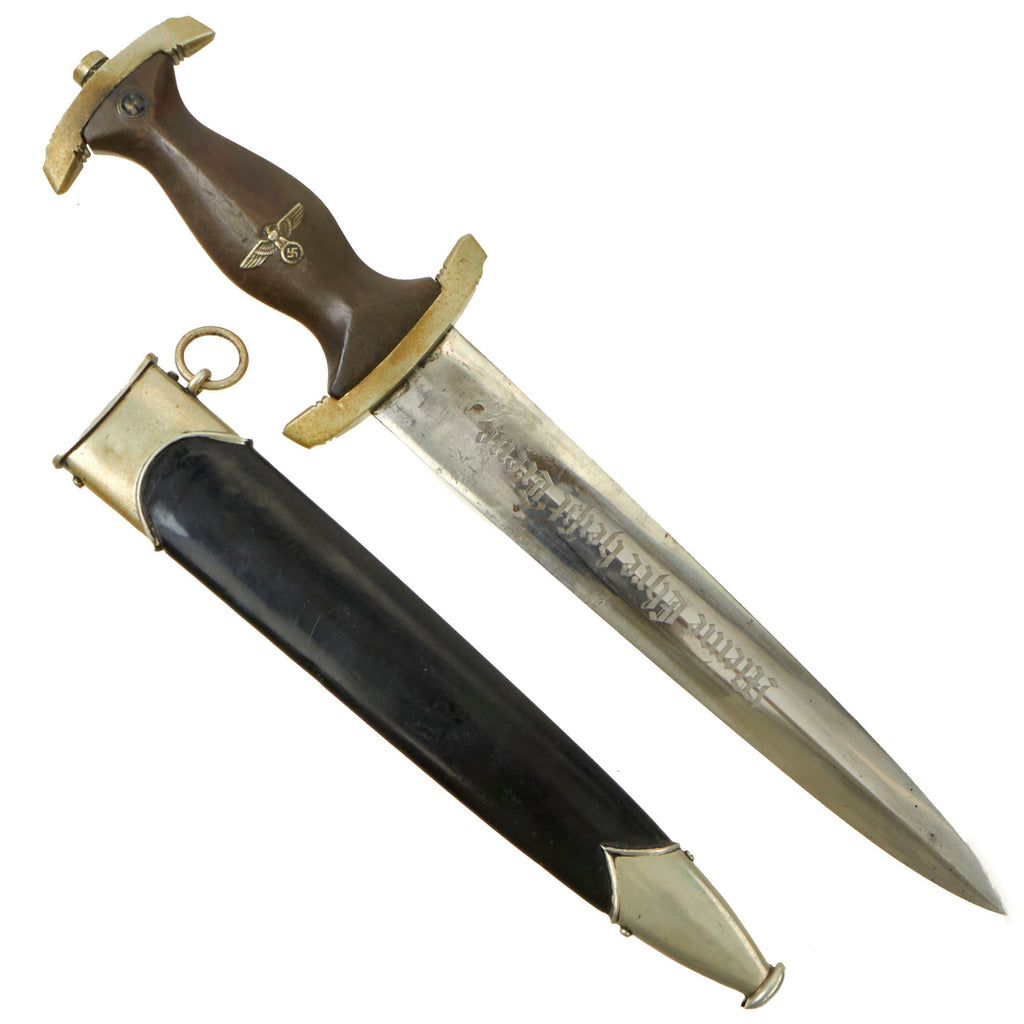Item Description
Original Item: Only One Available: The SS (Schutzstaffel - 'Protection Squadron') was originally formed in 1925, ostensibly to act as a small, loyal bodyguard unit to protect the Führer, Adolf AH. Under the direction of the infamous Reichsführer-SS Heinrich Himmler, the SS grew to be the most ruthless and feared organization of the 20th century. They were the vanguard of NSDAP and eventually controlled nearly every function of German life and much of Occupied Europe. The SS-Ehrendolch (SS honor dagger) was introduced in 1933. Early on, members of the SS were awarded their daggers during a ceremony at the Feldherrnhalle Memorial in Munich. The annual ritual, charged with mysticism and meant to evoke the traditions of medieval Teutonic knights, was held on 9 November, the date of the unsuccessful Munich Putsch of 1923. Both officers and enlisted men wore the identical dagger until 1936. After this time, only enlisted men wore the M1933 dagger.
The SS Dagger was equipped with nickel cross guards with an ebony wood grip. The black grip contained a National eagle with swas insignia recessed in the center area and an ᛋᛋ doppelte Siegrune (Double Sig/Victory Rune) button inset at the top. On early examples the scabbard shell surface was factory blackened using a metal bluing process. The scabbard had nickel mounts. The SS blade was a polished type containing the SS motto, Meine Ehre Heisst Treue (My Honor is Loyalty). Early examples bore one of three district stampings on the lower reverse crossguard of I, II, or III. Early examples were mostly hand-fit. Production of later examples was more standardized, using cheaper, nickel-plated fittings with black painted scabbard shells. They could be held with a standard belt hanger, or a much rarer vertical hanger.
This wonderful early example was produced by the desirable firm of Robert Klaas, Feine Solinger Stahlwaren (Fine Solingen Steelware), based in the Ohligs borough of Solingen, Germany, the Legendary "City of Blades." It was and still is the blade-making capital of Germany, with a centuries long history of edged weapon manufacture. Their well-known trademark "Facing Storks" emblem was first registered in 1893, and the rear ricasso of the blade bears the companies address marking:
ROBERT KLAAS
+ (Kissing Storks) +
SOLINGEN
The firm was originally founded in 1834 by Peter Daniels Pauls, whose daughter married scissor maker Friedrich Robert Klaas. After his father-in-law passed away, all was left to Klaas and his wife, so he merged his scissor business with the knife business, and registered with Solingen authorities in 1869. The company passed to his sons, and then his son-in-law. It survived WWI, WWII, and still exists today, per J. Anthony Carter's fine work GERMAN SWORD AND KNIFE MAKERS. Later daggers would only have the SS contract information.
The blade on this example is in very good condition, showing some signs of past oxidation from the runners and handling near the cross guard, which was later cleaned away. In spite of this, it still retains most of the original factory final grind cross grain, visible throughout the blade. This texture is iconic, and is the definitive identifying characteristic for a real WWII German Blade. There is some wear from the runners, present on virtually every German dagger blade, as as well as some scattered oxidation, but aside from the ricasso area, it's really in lovely condition. The etched SS motto, Meine Ehre heißt Treue (Loyalty is my Honor) is crisp with little wear and almost all of the factory darkening. The blade shoulders perfectly meet the lower crossguard contour, and is solid in the grip.
The crossguards of this dagger and tang nut are in very good patinated condition throughout, and are of the earliest solid nickel silver construction. They have smooth surfaces, good crisp edges and precise accent grooves. They have faded overall due to oxidation as well as what looks to be grease or wax, and now have a greenish patina, with some brown in areas, particularly on the pommel guard. The cross guard is marked with district number III on the rear. Per customer requests, we always check the inside of the guard on these daggers, and both the cross and pommel guards are marked St. St. on the inside, straddling the central tang hole. This marking has been seen on other examples by this maker and others.
The ebony grip is a nice example showing in very good shape, and does not show any missing chunks, like we so often see. The ebony wood is unfortunately brittle, and the treatment used to give it a uniform look exacerbates this. The wood does look somewhat worn from cleaning and age, and there is some reddish staining, possibly from long germ exposure to leather or rust. The symbol button is positioned at about 7:00 o'clock, as it should be. The silvered ᛋᛋ doppelte Siegrune symbol and double circles around them does show wear and oxidation, with the enamel and metal both worn from use. The nickel grip eagle is the "high-necked" type with the beak pointing slightly up. It remains in crisp condition, showing little wear to the bird's head, breast and wing feathering and to the talons, wreath or swas.
The scabbard itself is a very good example, with just a bit of a bend towards the middle, and no major dents in the steel body. It looks to be the correct early ear type, which originally had a black "anodized" finish, which was then lacquered to protect it. This looks to have completely worn away, and then it was repainted with thick black enamel lacquer. We cannot confirm this was done during wartime, but it was definitely repainted long ago, as we can now see checking and crazing in the finish, which takes decades to develop. The matching solid nickel silver scabbard mounts are in very good lightly oxidized condition, though the lower ball has been completely crushed in and split along the seam. The weaker nickel alloy used in early models (later ones used steel) is unfortunately prone to denting. All four dome headed screws are present, and in good condition.
A wonderful early SS dagger by a desirable Solingen maker with a really nice blade, complete with a repainted scabbard! Ready to display!
Specifications:
Blade Length: 8 3/4"
Overall length: 13 3/4”
Crossguard: 3”
Scabbard Length: 10”
- This product is available for international shipping. Shipping not available to: Australia, France, or Germany
- Due to legal restrictions this item cannot be shipped to Australia, France or Germany. This is not a comprehensive list and other countries may be added in the future.
- Not eligible for payment with Paypal or Amazon

















